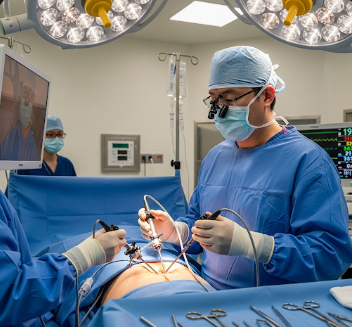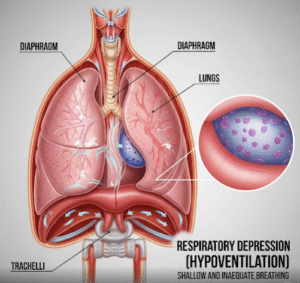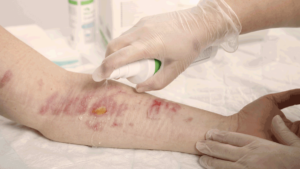Overview
Adrenalectomy, or adrenal gland removal surgery, is a specialized procedure performed to remove one or both adrenal glands, which are small, triangular-shaped glands located above the kidneys. These glands play a crucial role in producing essential hormones such as cortisol, aldosterone, adrenaline, and norepinephrine, which regulate metabolism, blood pressure, stress response, and electrolyte balance.
Adrenalectomy is primarily indicated for adrenal tumors, hyperfunctioning glands (overproduction of hormones), or adrenal cancer. In many cases, patients with primary hyperaldosteronism, Cushing’s syndrome, or pheochromocytoma require adrenalectomy to relieve symptoms and prevent long-term complications.
In Korea, adrenalectomy is performed using highly advanced techniques including laparoscopic and robotic-assisted approaches, which allow for smaller incisions, reduced blood loss, and faster recovery. Korean hospitals are internationally recognized for their expert endocrine surgeons, cutting-edge technology, and comprehensive post-surgical care, making the country a top choice for both domestic and international patients seeking safe and effective adrenal surgery.
What is Adrenalectomy?
Adrenalectomy involves the surgical removal of one (unilateral) or both (bilateral) adrenal glands. The choice of approach depends on the size of the tumor, location, and patient condition.
Surgical approaches include:
- Open adrenalectomy: Traditional approach with a larger incision, used for large or malignant tumors.
- Laparoscopic adrenalectomy: Minimally invasive, using small incisions and a camera for guidance; preferred for benign tumors.
- Robotic-assisted adrenalectomy: Offers enhanced precision and visualization, particularly useful for complex cases.
The primary goal of adrenalectomy is to eliminate hormone-producing tumors, normalize hormone levels, and reduce symptoms such as high blood pressure, fatigue, weight gain, or palpitations. The surgery may also prevent the spread of adrenal cancer in malignant cases.
What are the benefits?
- Effective treatment for hormone-producing adrenal tumors or cancer
- Relieves symptoms such as high blood pressure, fatigue, weight gain, and hormonal imbalance
- Reduces the risk of complications associated with untreated adrenal tumors
- Minimally invasive techniques in Korea result in smaller scars, shorter hospital stay, and faster recovery
- ✅ Robotic and laparoscopic options enhance precision, reduce complications, and allow for quicker return to daily life
- ✅ Access to specialized endocrine surgeons ensures high success rates and excellent long-term outcomes
Procedure Details
1) How should I prepare for Adrenalectomy?
Preparation for adrenalectomy is critical for a safe and successful outcome. Patients should:
- ➤ Undergo comprehensive medical evaluation, including blood tests, ECG, chest X-ray, and imaging (CT or MRI) to assess the adrenal glands and surrounding structures
- ➤ Review all medications with the surgeon; some drugs, such as blood thinners, may need to be temporarily discontinued
- ➤ Follow fasting instructions (usually 8–12 hours before surgery)
- ➤ Discuss hormone replacement therapy if there is a risk of adrenal insufficiency after surgery
- ➤ Optimize lifestyle factors such as quitting smoking, maintaining a healthy diet, and controlling chronic conditions like diabetes or hypertension
2) What happens during the procedure Adrenalectomy?
- ✅ The procedure is performed under general anesthesia
- ✅ The surgeon selects the appropriate approach (open, laparoscopic, or robotic-assisted) based on tumor size, location, and patient condition
- ✅ In laparoscopic or robotic surgery, small incisions are made, and a camera is inserted to guide the instruments
- ✅ The adrenal gland is carefully removed, preserving nearby organs and blood vessels
- ✅ For malignant or larger tumors, open surgery may be performed to ensure complete removal and safety
- ✅ After removal, the surgical site is closed with sutures or surgical staples, and the patient is transferred to recovery
3) What happens after an Adrenalectomy?
- ➤ Patients are monitored in the post-anesthesia care unit for vital signs and hormone levels
- ➤ Pain management is provided through oral or intravenous medication
- ➤ Mild soreness or bruising at the incision site is common
- ➤ Most patients can resume light activities within a few days, while full recovery may take 2–6 weeks depending on the surgical approach
- ➤ If both adrenal glands are removed, lifelong hormone replacement therapy may be necessary
- ➤ Follow-up appointments are scheduled to monitor recovery, hormone levels, and overall health
Risks / Benefits
Potential Risks:
- ➤ Bleeding or hematoma formation
- ➤ Infection at the incision site
- ➤ Hormonal imbalance requiring replacement therapy
- ➤ Injury to nearby organs such as kidneys, liver, or pancreas
- ➤ Rare complications such as adrenal insufficiency or blood clots
Benefits:
- ✅ Effective treatment for adrenal tumors or adrenal cancer
- ✅ Relieves symptoms caused by hormone overproduction
- ✅ Prevents tumor progression or metastasis
- ✅ Minimally invasive surgery in Korea ensures faster recovery and lower complication rates
- ✅ Enhances quality of life and long-term well-being
Recovery and Outlook
Recovery depends on the surgical approach and patient health:
- Laparoscopic adrenalectomy: Hospital stay of 2–3 days; return to normal activities within 1–2 weeks
- Open adrenalectomy: Hospital stay of 5–7 days; full recovery in 4–6 weeks
- Patients are advised to avoid heavy lifting and strenuous activity for several weeks
- Hormone levels are monitored post-surgery, and temporary or permanent hormone replacement therapy may be required
- Most patients experience significant improvement in symptoms and return to a normal, active lifestyle
When To Call the Doctor
Patients should contact their surgeon immediately if they experience:
- ➤ Fever or signs of infection at the incision site
- ➤ Persistent or severe pain not controlled by medication
- ➤ Dizziness, fatigue, or symptoms of hormone imbalance
- ➤ Excessive bleeding or swelling
- ➤ Any unusual symptoms after surgery
Best Korea Option / Process
- ✅ Korea is world-renowned for endocrine surgery, including adrenalectomy
- ✅ Hospitals in Seoul and Busan offer laparoscopic and robotic-assisted adrenalectomy performed by expert endocrine surgeons
- ✅ Comprehensive care includes pre-surgery evaluation, surgery, and post-operative monitoring
- ✅ International patients benefit from VIP services, including airport pickup, English-speaking staff, and rehabilitation programs
- ✅ Costs in Korea are affordable compared to the US or Europe, while outcomes remain world-class
- ✅ Advanced technology, meticulous surgical techniques, and a strong focus on patient safety ensure excellent success rates













